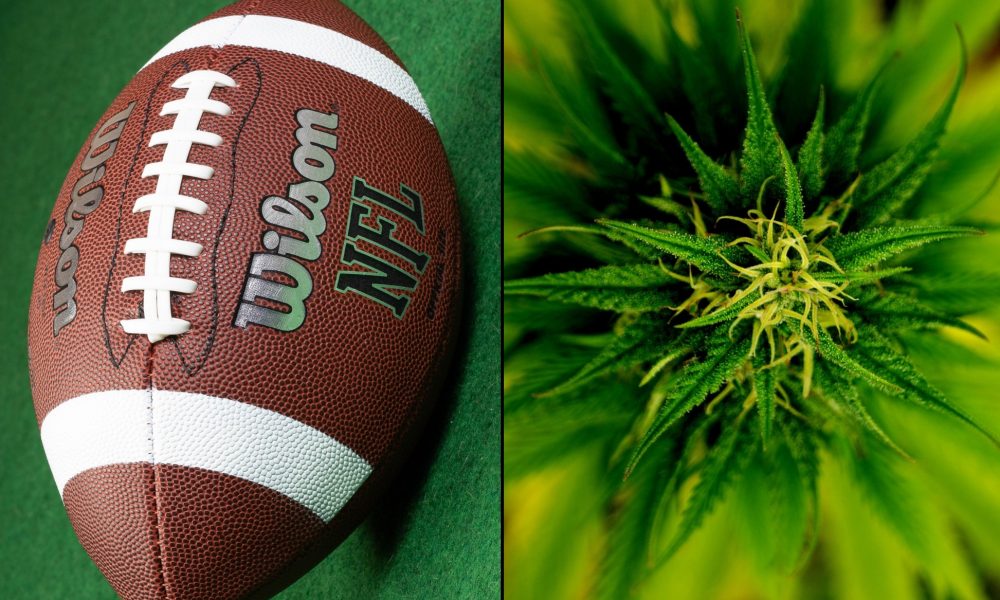The National Football League (NFL) is partnering with Canadian researchers on a clinical trial to test the safety and efficacy of CBD for pain management and neuroprotection from concussions—key issues for many football players who experience injuries as part of the game.
The Phase 1 trial will involve 35 people who will receive either a placebo or CBD-rich cannabis extract to test whether it’s “safe, well-tolerated and without adverse physiological and psychological dysfunction” for daily use.
NFL has committed hundreds of thousands of dollars to research investigating the therapeutic potential of the non-intoxicating cannabinoid in recent years, including funding for studies on CBD as a potential opioid alternative.
For this study, researchers at the University of Regina will collaborate with NFL, aiming to identify the “optimal” dose of cannabidiol that can be safely consumed on a daily basis. Participants who receive the CBD will start with five milligrams per kilogram of body weight, and that will be gradually increased to 30 milligrams per kilogram.
“This study is designed to investigate anti-inflammatory and neuroprotection of the CBD formulation to determine whether it can be used on a daily basis safely during the periods of intensive exercise (resistance) training during the off-season prior to competition,” a notice says.
“Specifically, the investigators will investigate the pharmacokinetic, physiological, and psychological effects of CBD,” it says. “The investigators hypothesize that the CBD formulations will be non-intoxicating (non-psychotropic), safe, well-tolerated and do not cause adverse physiological or psychological dysfunction.”
NFL first announced that it would be providing funding for the project—as well as a separate study based at the University of California San Diego—in 2022. The league agreed to spend $1 million on the cannabis trials.
NFL and its players union separately announced last year announced that they are jointly awarding another round of funding to support independent research on the therapeutic benefits of CBD as a pain treatment alternative to opioids for players with concussions.
A commissioner of the NFL and the league’s players union previewed the funding plan in June 2022, emphasizing the strong interest among players and other stakeholders. The joint NFL-NFLPA committee also held two informational forums on CBD in 2020.
Outside of the research context, NFL’s drug testing policy changed demonstrably in 2020 as part of a collective bargaining agreement. It stipulates that players will not face the possibility of being suspended from games over positive tests for any drug—not just marijuana.
Other sports leagues are similarly adopted revised policies as the state-level cannabis legalization movement continues to spread.
For example, a new collegiate athletics proposal would remove marijuana from the list of substances included in drug screenings for National Collegiate Athletic Association (NCAA) championship competitions, with officials set to vote on the matter in June.
The plan would build on a 2022 change that increased the allowable THC threshold for college athletes, aligning NCAA’s rules with those of the World Anti-Doping Agency (WADA).
The Ultimate Fighting Championship (UFC) announced last month that it is formally removing marijuana from its newly modified banned substances list for athletes, also building on an earlier reform.
Last month, the National Basketball Association (NBA) and its players union signed a collective bargaining agreement that removes marijuana from the league’s banned substances list and lays out rules allowing players to invest in and promote cannabis brands—with certain exceptions.
Nevada sports regulators voted last year to send a proposed regulatory amendment to the governor that would protect athletes from being penalized over using or possessing marijuana in compliance with state law.
The New York Media Softball League (NYMSL)—which has teams representing The Wall Street Journal, High Times and BuzzFeed among its ranks—announced last July that it was launching a sponsorship deal with a Kentucky-based CBD company.
The idea behind the collaboration was inspired by moves by Major League Baseball (MLB) and certain teams like the Kansas City Royals and Chicago Cubs that have also recently partnered with CBD businesses.
MLB itself announced its league-wide partnership with a popular CBD brand in 2022. Charlotte’s Web Holdings, one of the most recognizable hemp-derived CBD companies in the country, signed the deal with league to become the “Official CBD of MLB.”
While advocates have welcomed these changes, there’s been criticism of the World Anti-Doping Agency over its ongoing cannabis ban. Members of a panel within the agency said in an opinion piece last August that marijuana use by athletes violates the “spirit of sport,” making them unfit role models whose potential impairment could put others at risk.
Advocates strongly urged WADA to enact a reform after U.S. runner Sha’Carri Richardson was suspended from participating in Olympics events due to a positive THC test in 2021.
Following that suspension, the U.S. Anti-Doping Agency (USADA) said that the international rules on marijuana “must change,” the White House and President Joe Biden himself signaled that it was time for new policies and congressional lawmakers amplified that message.
States That Legalize Marijuana See Enhanced College Basketball Recruitment, Study Finds
Image element courtesy of Marco Verch.
Read the full article here









